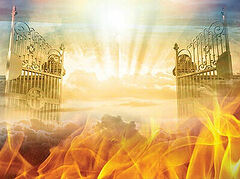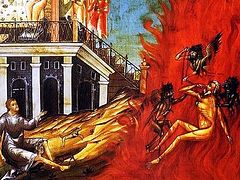In this Gospel reading, beloved brothers and sisters, our Lord Jesus Christ Himself depicts the visible inequality of people’s condition and life in the present, temporary life, and accordingly the inequality of people’s fate in the other, afterlife, which has no end. This Gospel is highly instructive for all of us, for people of every condition and rank. We are talking about a rich man whose name is not mentioned, and about a beggar named Lazarus (Luke 16:19-31).
Who is the hapless rich man, the opulent merrymaker who inherited eternal torment? Judging by the fact that he calls Abraham father, and that he and his brothers were aware of the writings of Moses and the prophets, it should be assumed that the rich man was of Jewish lineage and law, a descendant of Abraham. What was his sin, his guilt, for which he so unwittingly fell into hell?
The Gospel says that he was rich; but without a doubt, it was not wealth that caused such terrible torment that the rich man experienced in hell. Abraham was a very rich man in his time, but wealth did not prevent him from being a friend of God, because he was a stranger and hospitable, and was faithful and obedient to God in everything. It is further said that the rich man dressed in purple and fine linen—that is, in a purely royal way—and feasted resplendently every day.
It would seem that this is not his special fault either; if he is a rich man who has thousands and maybe millions in wealth and huge estates, why not dress up in silk and velvet? In our time this would not be considered a special luxury, but linen was especially expensive at that time. It goes on to say that he feasted resplendently every day, so he ate and drank and made merry with his friends and flatterers; but even in our enlightened time, frequent feasts, expensive dinners, are held often and those who arrange them do not think that they are sinning heavily and will go to hell, even if they forget the poor.
Let’s go on looking for the guilt of the rich, merry man. What does the Gospel say? There was a certain beggar named Lazarus, which was laid at his gate, full of sores, and desiring to be fed with the crumbs which fell from the rich man’s table: moreover, the dogs came and licked his sores. This is where the real guilt of the rich man lies, making him guilty of both his luxurious attire and his daily, rich feasts. This guilt is hard-heartedness and unmercifulness to the poor, originating in him from his passion for luxury and extravagance, for idle and merry living.
At the very gates of his house lies poor wounded Lazarus—the kind of poor man who by his appearance and position alone should have aroused compassion and mercy and aroused the rich man to help. But even when the rich man sees him, he as if does not see him, and does not show him the slightest compassion. He is busy with his feasts; dogs are more compassionate than him—they come and lick Lazarus’ wounds.
Lazarus wanted to eat crumbs from the rich man’s table, which means that nothing was given to him from the rich meals. It is for this hardness of heart and unmercifulness that the rich man is sent to hell after death; and Lazarus, for his suffering, uncomplaining patience, his honest poverty and deprivation, was awarded the bosom of Abraham, eternal peace and bliss. What lesson does this depiction of the rich and the poor teach us, this description of their life and condition on earth and their fate immediately after death?
First, the lesson that wealth and poverty, health and illness, joy and sorrow—everything in this life soon passes and disappears; but people’s deeds, their vices and virtues do not die, but pass with them into eternity. And there they will either be justified or condemned before the Judge of all thoughts and deeds, and they will either lead them into paradise, or they will plunge them into the abysses of hell in the underworld, from whence there will be no escape, forever.
Therefore, beloved brothers and sisters, let us not be cruel and merciless to the poor when we ourselves have plenty, let us not be arrogant in wealth and contentment, but let us share according to our strength with the poor, so that if we become impoverished in good deeds, they will accept us into eternal habitations (cf. Luke 16:9), according to our Savior.
See how, after the death of Lazarus and the rich man, the fate and condition of both suddenly change! The beggar died and was carried by the Angels to the bosom of Abraham. What honor, what love the celestials have for him! He is carried and accompanied to paradise as a fellow citizen by the angels of heaven, these faithful friends of people loyal to God. The rich man also died, and they buried him; and in hell, being in torment, he lifted up his eyes, saw Abraham afar off and Lazarus in his bosom. What a sight! Lazarus, a beggar, a sick man, once despised by the rich, is now in a place of light, coolness, bliss, while the rich man himself is in hell, in torment. No help from anywhere. And where are the companions and flatterers? Maybe they’re in hell too?
Then you know what follows: The rich man asks Abraham to send Lazarus, so that he would wet the end, only the end of his finger in water and cool his tongue, this voluptuous tongue, now terribly burning and withered. But the rich man is also denied this. True, Abraham calls him his child, as the former rich man called him his father, but this name, “child,”served only as a reproach to the rich man who did not do the works of Abraham, who did not have his abstinence and hospitality.
What is the reason for the denial of the drop of water? That the rich man received his good in his life, but Lazarus received his evil. What was his good? That which he considered good, i.e., he ate, drank, dressed elegantly, had fun, but did not think about God and pleasing Him, did not do good deeds, and therefore, lived like a dumb animal, not caring about the immortal soul. Consequently, what he lived for, he received; what he considered his good, he enjoyed. He did not prepare anything for eternity, no good deeds, he did not acquire desire and need for spiritual and eternal benefits. Love for God and his neighbor was alien to him. There is nothing for him to do in paradise, where there is only a place for the righteous and those who love God and each other with pure love. Lazarus, in the crucible of illness and deprivation, was cleansed of sins and suffered punishment for them in the very illness and deprivation itself. Because, says Abraham, he is comforted here, and you are suffering. That’s how the roles of both suddenly changed—and right after the death of both.
Oh, how impermanent, fragile, and false is everything earthly! How constant and eternal is virtue and its reward!
Further, Abraham presents another reason to the rich man as to why Lazarus cannot come to him, the former rich man, and with the slightest comfort—only a drop of water on his finger—precisely because an impassable abyss has been established between those imprisoned in hell and those in paradise. This must have struck the rich man with a new horror of hopelessness in pardon, the horror of despair, and he no longer asks Abraham for himself, but for his brothers, that he might send Lazarus to them to testify to the actual existence of hell and eternal torment in its flames, and to the existence of paradise—the eternal dwelling and place of joy of those who have lived holy lives, or who have suffered punishment for sins and repented. But the former rich man is denied this also, and he is told that his brothers should listen to Moses and the prophets, i.e., read and obey their writings.
The rich man again begged Abraham for the same thing, and he was again refused. If they did not listen to Moses and the prophets who spoke by the Holy Spirit, then they would not believe the dead as proof of the existence of eternal torment and eternal life.
A good, instructive lesson to all the current crazy smart people who do not believe in the existence of human souls after death, in the actual existence of eternal fire, in the eternity of the torment of unrepentant sinners, and in the future bliss. They, too, would like the dead to come to them more often and assure them of the truth of what is said in the Gospel, but the dead will not come to them to assure them that the eternal Truth itself has spoken once and forever—Christ our God. And if they want to change their way of thinking and living and attain eternal life, then let them diligently read and listen to the Gospel and fulfill what is written in it.
This is a brief discussion of today’s Gospel. Reflect on what is written in it and believe with all your heart everything that is written in it. One jot or one tittle shall in no wise pass from what the Truth itself, Christ, has said, and all will be fulfilled (Matt. 5:18). Amen.




